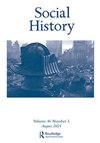“她们应有的地位”:大约1924-1973年,独立后的爱尔兰,妇女、工作和婚姻酒吧
IF 1.1
1区 历史学
Q1 HISTORY
引用次数: 5
摘要
1973年以前,爱尔兰法律规定女性在结婚后必须退休。某些较低的等级仅限女性,工资等级由婚姻状况和性别来划分。在教学和私营部门也非正式地遵守婚姻禁令。对于保持单身的妇女来说,在大多数领域获得晋升是困难和不寻常的。本文探讨了独立后的爱尔兰公务员婚姻酒吧的复杂历史,以及与教学和某些私人就业领域的婚姻酒吧的关系。它认为,天主教的“家庭工资”的社会观念是20世纪爱尔兰婚姻酒吧盛行的核心。单一收入家庭被认为是理想的,女性工人通常被父权政府和宗教等级视为对男性养家糊口者的威胁。虽然对婚姻禁令的抗议和反对并不总是很普遍,但“家庭工资”的就业模式虽然是爱尔兰独立后理想化的,但并不符合经济现实和许多女性的生活经历。最后,这篇文章强调了与婚姻酒吧相关的女性激进主义,它的最终废除,以及它对爱尔兰妇女的问题遗产。本文章由计算机程序翻译,如有差异,请以英文原文为准。
‘Their proper place’: women, work and the marriage bar in independent Ireland, c. 1924–1973
ABSTRACT Until 1973, women in the Irish civil service were legally required to retire from employment after marriage. Certain lower grades were female only, and pay grades were demarked by both marital status and gender. The marriage bar was also observed informally in teaching and in the private sector. For women who remained single, it was difficult and unusual to achieve promotion in most fields. This article explores the complex history of the civil service marriage bar in independent Ireland, and in relation to marriage bars in teaching and certain spheres of private employment. It argues that the Catholic social concept of a ‘family wage’ was central to the prevalence of the marriage bar in twentieth-century Ireland. A single-income household was seen as the ideal, with female workers often viewed by a patriarchal government and religious hierarchy as a threat to male breadwinners. While protest and opposition to the marriage bar was not always widespread, the ‘family wage’ model of employment, although idealized from Irish independence, did not fit with economic reality and the lived experience of many women. Finally, this article highlights female activism associated with the marriage bar, its eventual abrogation, and its problematic legacy for women in Ireland.
求助全文
通过发布文献求助,成功后即可免费获取论文全文。
去求助
来源期刊

Social History
HISTORY-
CiteScore
1.10
自引率
0.00%
发文量
37
期刊介绍:
For more than thirty years, Social History has published scholarly work of consistently high quality, without restrictions of period or geography. Social History is now minded to develop further the scope of the journal in content and to seek further experiment in terms of format. The editorial object remains unchanged - to enable discussion, to provoke argument, and to create space for criticism and scholarship. In recent years the content of Social History has expanded to include a good deal more European and American work as well as, increasingly, work from and about Africa, South Asia and Latin America.
 求助内容:
求助内容: 应助结果提醒方式:
应助结果提醒方式:


